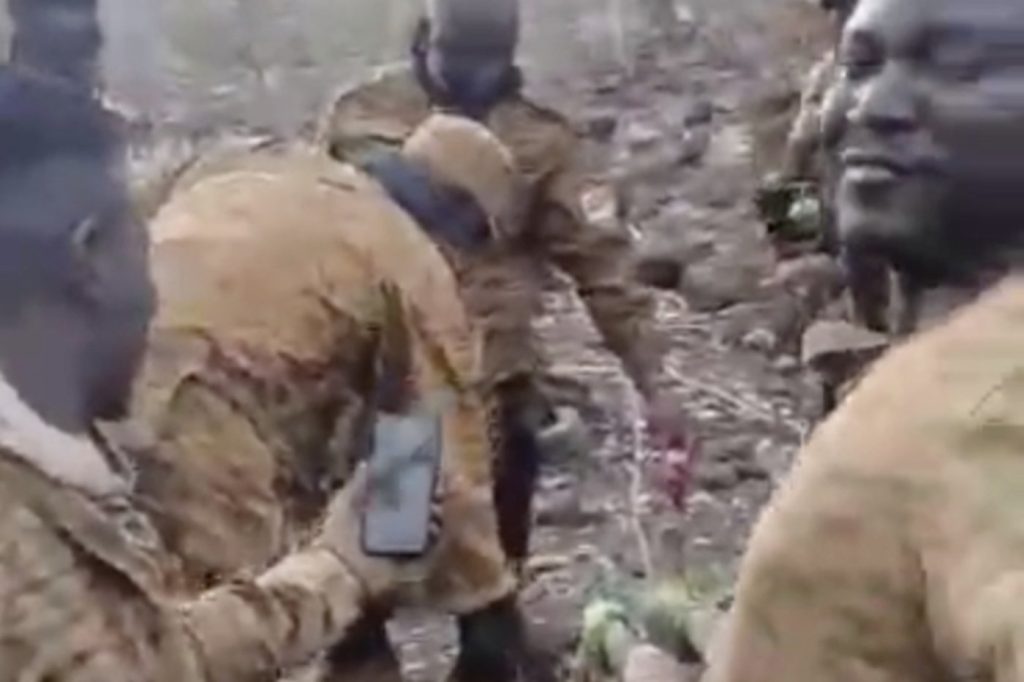DAKAR, Senegal (AP) --- The International Criminal Court (ICC) has been urged to examine a confidential legal brief alleging that the Russia-linked Wagner Group has committed war crimes. This includes spreading horrifying images of violence in West Africa on social media, some of which hint at cannibalism. The brief was exclusively reviewed by The Associated Press.
Violence in the Sahel region, a dry strip of land south of the Sahara Desert, has reached unprecedented levels as military regimes confront extremist factions associated with al-Qaida and the Islamic State group. According to data compiled by the Institute for Economics and Peace, the region was noted as the deadliest locale for extremism last year, witnessing nearly 8,000 deaths globally attributed to such violence.
While the United States and other Western nations are withdrawing from the area, Russia has been capitalizing on this situation by enhancing military ties with several African countries through Wagner, a private security firm closely affiliated with the Russian military and intelligence apparatus.
Observers point out that this strategy has resulted in a surge of atrocities and inhumane treatment not witnessed in the region for decades. Social media has emerged as a critical platform, revealing the alleged horrors that frequently unfold in remote locations lacking governmental or external scrutiny.
Experts believe that although the authenticity of some images remains challenging to confirm, they could be used as evidence of war crimes. The ICC's legal brief argues that the act of disseminating these images on social media could also qualify as a war crime, marking a significant development in legal discourse.
The brief highlights a network of social media accounts, likely run by current or former members of Wagner, which reposts content purportedly created by Wagner fighters. These posts feature videos showcasing abuses by armed personnel in uniforms, often accompanied by dehumanizing commentary. In these videos, uniformed individuals are depicted mutilating corpses believed to be civilians, engaging in acts such as organ removal and posing with dismembered body parts. One fighter is recorded claiming he intends to consume a human liver, while another discusses the removal of a heart.
Although the identities of the account administrators remain hidden, open-source analysts suspect they are connected to Wagner due to the content and visual elements, including the group's logo. AP's investigation supports the authenticity of both the body parts depicted in the footage and the military attire worn by the individuals.
The videos and images, presented in a mix of French and local dialects, seem to serve the dual purpose of humiliating adversaries of Wagner and its allies while also threatening civilian populations whose young members face coercion to join extremist organizations. However, experts note that such tactics can inadvertently drive retaliation and bolster recruitment for jihadist groups.
The governments of Mali and Burkina Faso have publicly condemned these graphic videos and initiated inquiries, though it remains unclear whether any individuals have been identified from the footage.
The U.S. State Department has classified Wagner as a "transnational criminal organization." Despite inquiries from AP, Wagner has not issued a response regarding the videos in question. Following the death of Wagner's leader Yevgeny Prigozhin in a plane crash in 2023, Moscow has been developing another organization, the Africa Corps, intended to operate under direct oversight from Russian officials.
Recently, Wagner announced its withdrawal from Mali, declaring its mission complete via a post on Telegram. In contrast, the Africa Corps stated that it maintains its presence in the country. As reported by U.S. officials, approximately 2,000 Russian mercenaries are currently engaged in combat alongside Malian armed forces, but it remains uncertain how many belong to Wagner or the Africa Corps.
According to the Rome Statute that established the ICC, violations of personal dignity through degrading treatment constitute war crimes. Legal experts from UC Berkeley argue that Wagner's alleged misuse of social media falls under this category. The brief calls for the ICC to investigate individuals associated with Wagner and the governments of Mali and Russia for purported abuses occurring in northern and central Mali from December 2021 through July 2024, including extrajudicial killings, torture, mutilation, and acts of cannibalism.
The brief further requests that the court scrutinize crimes perpetrated online, asserting that this form of violence is interlinked with physical crimes and enlarges the scope of victimization. While the ICC declined to comment on the brief, it acknowledged awareness of numerous reports regarding serious human rights violations across Mali and has maintained a close watch on the evolving situation.
Human Rights Watch has recorded numerous atrocities committed by Wagner and other armed factions in Mali. The organization notes that accountability for these abuses remains minimal, as the military government shows reluctance to investigate actions involving its armed forces and Russian mercenaries. Ilaria Allegrozzi, a researcher from the group, emphasized that acquiring detailed information has become increasingly challenging due to the Malian government's persistent suppression of political opposition, civil society, media, and peaceful dissent. This situation is exacerbated by the withdrawal of U.N. peacekeeping forces from Mali in December 2023, which was requested by the government, thereby facilitating further human rights violations.











